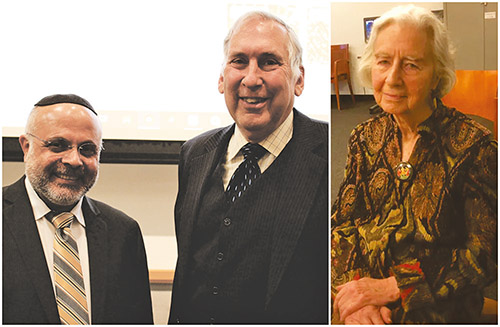
(Courtesy of Touro University) Touro University, a leader in Holocaust studies, hosted two programs to mark Yom HaShoah and spread understanding of the world’s largest genocide. One event presented the firsthand testimony of a survivor who was enslaved in a work camp and forced on a death march, but who ultimately escaped with the help of righteous gentiles. The other program featured experts on the Nuremberg Doctors’ Trial, an event which continues to influence medical ethics today.
We Must Find Our Inner Strength, Survivor Tells Touro Audience
Professor Anne Bayefsky, director of the Touro Institute on Human Rights and the Holocaust, invited Maritza Shelley, a 93-year-old Holocaust survivor from Hungary, to share her story. Maritza was a teenager in Budapest when the Nazis invaded Hungary. Along with her mother and older sister, she was sent to a work camp in an old brick factory. Every day, she built ditches to protect Nazi aligned troops from Russian tanks. The work was arduous; food consisted of watery soup, a piece of bread and maybe a potato; water was severely restricted. As the allied forces began to push back the Germans, the camp was emptied and the Shelley family, along with other inhabitants, were sent on a death march to Germany. Maritza’s mother recognized that, even if they survived the march, they would likely be killed in Germany.
Her mother’s quick thinking enabled them to survive. They escaped from the march and made their way to a non-Jewish friend’s home in Budapest. The friend helped them find a safe hiding place, where they stayed for the rest of the war.
These days, Maritza is on a mission to share her story as widely as possible, so that others can survive. “I was constantly afraid throughout my ordeal except when I started my escape. At that point, I was doing what I wanted to do for myself, and I had found my own inner strength. So, my fear was gone. We all can and must find our strength when we need it most,” she said.
“Maritza’s story of endurance along with members of the family is a testament to the human spirit,” said Bayefsky.
“Intolerance and bigotry can never be the answer when encountering groups of people, or an entire race, that look different, practice different religions, or have different world views,” said Ambassador Asaf Zamir, Consul General of Israel in the United States, who also spoke at the program.
The Enduring Impact of the Nuremberg Doctors’ Trial
The Bioethics and the Holocaust program at New York Medical College called attention to lessons of the Holocaust with a symposium on lessons of the Nuremberg Doctors’ Trial.
“In 1946-1947 the Allied Powers placed over 20 German physicians and hospital administrators on trial for crimes against humanity, “ observed Dr. Edward C. Halperin, Chancellor/CEO of New York Medical College and holder of the Miriam Popack Chair in Bioethics and the Holocaust. “This trial established the Nuremberg Code of medical ethics, which include the standards of informed consent for human medical experimentation which we continue to use today. It is an event worth commemorating.”
The Yom HaShoah commemoration included a discussion of the derivation of modern concepts of informed consent; the role of Nuremberg Prosecutor and U.S. Supreme Court Justice Robert Jackson in the trials; the development of the Nuremberg Code; Nazi doctors and their relevance today; and a conversation about the experiences of Adolf Eichmann’s prison guards, one of the primary orchestrators of the Holocaust.
The Nuremberg Doctors’ Trial led to the development of the Nuremberg Code, a set of ethical research principles for human experimentation. Touro’s program for medical and health professionals explored how lessons from the Holocaust continue to impact ethical conduct of research, health care policy and practice, and professional identity formation.
“New York Medical College and Touro University will continue to train professionals to not only understand the science of medicine, but also to infuse their education with a reverence for life, to infuse clinical education with morality, a devotion to ethics and a sincere caring for others,” said Rabbi Moshe Krupka, executive vice president of Touro University.
To learn more about Touro University visit www.touro.edu.








